Introduction
The cybersecurity field is booming! With the increasing number of cyber threats, there's a critical need for skilled professionals. According to Statista, the global cybersecurity workforce has grown significantly, reaching 5.45 million in 2024, up from 4.6 million just a year earlier. In the US alone, the Bureau of Labor Statistics projects a need for 188,300 cybersecurity engineers by 2030.
But, why is there so much demand for cyber security professionals?
As businesses move online, their data and processes become more vulnerable to attacks. To protect sensitive information and critical systems, companies are actively recruiting cybersecurity engineers to safeguard their networks from malicious threats.
Is Cybersecurity Right for You?
While cybersecurity may seem complex, proper training can equip you with the skills to excel in this rewarding field. Cybersecurity careers offer not only competitive salaries but also job security. Whether you have a strong IT background or not, this exciting branch of IT is open to anyone with a passion for protecting information.
Ready to Dive In? This blog will answer all your questions about becoming a cybersecurity engineer:
- What is a cybersecurity engineer?
- What does a cybersecurity engineer do?
- What are the responsibilities of a cybersecurity engineer?
- What skills and knowledge are required for a cybersecurity career?
- How can you become a cybersecurity engineer?
Let's dive deep and explore the exciting world of cybersecurity engineering!
How to Become a Cyber Security Engineer?
Now, comes the real deal, how to become a cyber security engineer?
Become a cyber warrior! Build a foundation in computers and networks. Earn a cybersecurity degree or certifications like Security+ [CompTIA Security+]. Hone skills in hacking (ethically!) and Cyber security tools. Practice on virtual labs to fortify your defenses. Land an entry-level IT security role to gain experience. Stay curious, the cyber landscape is ever-changing!
We all know that cybersecurity training and certification are the gateway to being one. However, it is important to know the cyber security engineer requirements, roles, and responsibilities first. So, let’s check out!
Roles & Responsibilities of a Cyber Security Engineer
Here is the list of tasks that cyber security engineers need to perform throughout their tenure:
- Plan, implement, monitor, manage, and update the organization’s databases, systems, and networks.
- Discuss and communicate information security goals with the departments within the organization.
- Represent the trusted point-of-source for information security to the business & its customers.
- Perform log analysis from various sources (for example firewall, IDS, endpoints) to figure out and investigate security threats and vulnerabilities.
- Perform malware analysis in both static and dynamic versions, file format analysis, and binary triage.
- Perform packet-level analysis (for example tcpdump, Wireshark, tshark) by applying knowledge of TCP or IP protocols (OSI layers 3-7) to investigate network traffic.
- Deeply manage monitor and configure the data backup systems, disaster recovery, and physical security.
- Monitor and allow technological improvements and ensure mini to massive changes to the information security environment.
- Identity and control of the budget allocated by the business for technological training.
- Manage and align the coordination of security teams and other departments.
- Create, manage and improve the security strategies for better protection & security.
- Conduct routine penetration testing, scanning & troubleshooting the systems for error and breaches.
- Treat breaches and intrusions on time.
- Participate actively in the change management process.
- Onboarding and providing cyber security training program to the new or junior IT security personnel

Responsibilities of Cyber Security Engineers
- Cyber risk & strategic analysis
- Vulnerability and detection assessments
- Cyber incident report
- Network/systems engineering
- Digital forensic
You can also check: Top Cyber Security Certifications
Cyber Security Engineer Requirements: Qualifications Needed
You must possess certain educational qualifications to be eligible for cyber security engineer job roles. Here are some of the cyber security engineer requirements and prerequisites required for aspiring professionals:
- First, in cyber security engineer requirements, candidates must obtain their Bachelor/Master’s degree in CS computer science, IT, engineering, or any other IT similar field.
- Must have fluency with web technologies & programming languages like C++, Python, Ruby, Go, Java, Power Shell & Node.
- They must be well-versed in the handling and maintenance of Firewalls and other endpoint security measures.
- Around 2 -3 years of experience in performing cybersecurity-related job roles (subjected to already working professionals).
Please Note - The above educational knowledge and experience depend on a company’s requirements and its size. While some companies might ask for the above qualifications as it is, others may include some additional requirements as well.
What is a Cyber Security Engineer?
Cybersecurity engineers are one of the important critical sections of a company’s human capital helping businesses protect their computer systems and online data from a range of cyberattacks. Hence, more and more young professionals are enrolling in cybersecurity training programs these days.
Through cyber security training and certification, you learn to take preventive actions to protect and encrypt the important data of enterprises from getting manipulated and stolen by hackers or high-level cybercriminals.
Cybercriminals are always looking to create & implement malicious ways to infiltrate inside the organization’s pivotal databases - to either spoil the company’s image or extract money out of the confidential data.
The role of CS experts is to manage, monitor, and test the business systems timely to ensure that their defenses are in activation and haven’t become obsolete. The CS engineer is also known as a web security engineer, data security engineer, or IT security engineer. These job roles vary from company to company.
What All Skills Are Required to Get Hired as a Cyber Security Engineer?

Here are the few skills required by cyber security engineers to get hired by top MNCs around the world.
1. Basics of Ethical Hacking
Cyber Security Engineers must have the ability to engage in ethical hacking. This type of testing involves conducting penetration tests to find flaws in systems that malicious attackers may be able to take advantage of. It is, therefore, essential for organizations to be proactive through in-depth knowledge of hackers’ approaches. The hackers must be up-to-date with the current trends of hacking together with the hacking tools and the hackers often use their skills to test the security protocols and see the extent to which the systems are resistant to cyber-attacks.
Begin on the path of ethical hacking with our ultimate ethical hacking guide!
2. Ability to know Operating Systems & Database Platforms
Cyber Security Engineers need to have a complete understanding of various operating systems including Linux/UNIX and Windows. Each is a different operating system with its security traits and flaws. The same applies to knowledge of database platforms like MySQL and MSSQL since mostly they store sensitive information. Such platforms must be secured by the engineers with the knowledge of their architecture as well as their ability to counter unauthorized access and data breaches.
3. Understanding of Network Architecture
Cyber Security Engineers should know network architecture before going ahead to learn how to become a cyber security engineer. Network administrators should be able to comprehend how different network components operate, for example, routers, switches, and firewalls, as well as why data moves across networks. This understanding is necessary to detect any possible vulnerable portions of the network and take corresponding countermeasures, such as the use of intrusion detection systems and network segmentation. Engineers should also understand different networking protocols and how to defend them from cyber security attacks.
4. Skills in Computer Forensics
Computer forensics is a science and technology that collects and analyzes computer-related evidence for purposes of investigating and prosecuting cyber crimes. Cyber Security engineers must be trained in forensic skills to track the origin of cyber attacks as well as comprehend the means utilized by attackers. This is a vital skill during a post-incident analysis and it helps to fortify the system defenses. Therefore, it is also learning the legal as well as ethical matters of digital investigation and evidence management.
5. Problem-Solving
Problem-solving forms an important part of cyber security. Cyber Security Engineers should be able to detect and rectify any breach of security that occurs swiftly. This involves critical reasoning and solving problems through logical approaches. Security engineers should be able to determine the source of their problem and propose efficient solutions to it. They should also be proactive by foreseeing various security challenges and making ways to prevent them.
6. Programming Skills
A Cyber Security Engineer must have programming skills. Writing scripts and tools for security automation, developing custom security solutions, and having a grasp of the operations of malware and viruses requires knowledge of programming languages such as Python, Java, or C++. Engineers pursuing programming courses can also understand the weaknesses in software and how they can be abused or protected against.
7. Risk Analysis
Risk analysis involves the assessment of the possible risks that can affect the information systems, as well as their effects. Cyber Security Engineers rely on risk analysis for identifying potential vulnerabilities, estimating the risk of security failure, and ranking the importance of security. This ability makes up an integral part of the overall security plan that takes into account the demands of the organization and the vulnerabilities in the online scene.
Here are the few personality skills that the CS engineers should be well-versed with:
- They must have strong analytical thinking.
- Must know how to conduct under tight deadlines.
- Must be effective & efficient at problem-solving.
- Must possess commendable & fluent written & verbal communication skills.
- Must be good at logical reasoning.
- Must be willing to travel domestically or internationally.
Why Cybersecurity Training Is Important in Current Scenario?
Here are some of the reasons why cybersecurity training course & need for skilled cyber security engineers have become all the more important in the recent few years:

1). Increasing Number of Complex Cyber Threats
The fight between organizations and cyber-attackers continues. As long as cybercriminals keep finding security vulnerabilities in business systems and networks and take advantage of them, cybercrimes will continue to follow. This shall lead to more demands for such roles, and people opting for cyber security engineer career path.
Industry analysts and cyber security researchers all agree that business owners need to stay updated with the latest cyber security measures to negate the threat. Some of the complex threats are-:
a) Cryptojacking: Mining for cryptocurrencies remains a valuable business, although you need to have the right setup and there are a lot of factors that indicate profitability. Mining for a single coin can be equivalent to using as much energy as a smaller nation consumes. This is the reason why cyber attackers are after breaching company networks for their own gain.
The result? A growing number of cryptojacking attacks. In the first half of 2019 alone, this figure stood at 52.7 million according to a report. As per Statista, the XMRig family was responsible for most of the cryptojacking crimes accounting for 35% in 2020. All this has made the need for cyber security engineer requirements across the globe.
b) IoT Threats: As more and more employees use their own devices at work, the greater the likelihood of exposure of their businesses. That doesn’t just include the security cameras and other smart devices that organizations use. All these elements can serve as additional entry points for cybercriminals who are still on the lookout for security vulnerabilities to exploit through their different types of cyber attacks.
c) Geopolitical Risks: Organizations risk losing more than just their reputational damage when their systems are breached. Cyber attacks on top companies, government organizations, and agencies can damage the image across the world if a good cyber security engineer is not hired at the right time.
Besides the loss of data, customers, and revenues, the brand image of the company gets hit across the world. People across the world will lose trust and will not do business with the company in question again. It also brings a bad name to the country in which the company is headquartered!
d) Mobile Malware: As per Statista, in the third quarter of 2022, there were identification of around 438 thousand packages used for installing mobile malware which is eight percent more compared to the second quarter of that year. Since Q1/2021, the number of malicious packages detected on mobile devices has been dropping, all thanks to more individuals looking forward how to become a cyber security engineer. Though there is a decrease in the number of cyberattacks on mobile devices, the threat is there to stay for days to come.
2). Lack of Skilled Cyber Security Engineers
Due to all the above reasons, there is always a growing demand among students to know what is a cybersecurity engineer, and how they can pursue it. However, the supply of skilled professionals is less. As per a survey, 53% of the organizations agreed that they lacked skilled cyber security engineers. But, a lack of skilled manpower also means an opportunity for you if you possess all the necessary cyber security engineer requirements and skills to get hired.
Read More: A good starting point for cyber security could be this fabulous and easy-to-understand cyber security guide.
Here comes the importance of a cyber security training program that prepares budding professionals to be a leader in this area.
You can also check:how to land a cybersecurity job with training.
3). Prioritizing the Threats
There is a range of cyber threats occurring each day. So, it is important from a company’s point of view to prioritize these threats. This is only possible through a robust cyber threat management policy backed by skilled cyber security engineers.
With the expansion of IoT, the frequency of attacks will eventually increase. The risk is growing each second. Hence, the hiring of passionate, dedicated, and intelligent CS experts is never getting shorter. As a result of this, the demand for CS experts is increasing 3 times more than the common IT jobs and 12 times more than the general jobs.
The salary of a cyber security engineer is quite high as well. If you have cleared your cyber security certifications successfully, you can expect good perks. If you are a seasoned professional who is already working in the field of CS, you can upskill yourself through cybersecurity training and ride the path to glory with a decent salary hike!
4). Rapid Technological Advancements
There is a greater speed rate of technological advancements. This is at once a blessing and a curse. Innovation makes processes easier and more efficient but, at the same time, leaves room for new cybersecurity risks to be discovered.
These leaps in technology make cyber security training and certification necessary because it helps you to keep up with their pace. It will make you see the danger and prevent you from being only one step ahead of cyber attackers, but rather ready for tomorrow's cyber-attacks.
5). Cost Reduction From Security Incidents
A cybersecurity event can be extremely destructive for an organization, resulting in large monetary damages, and negatively influencing an organization’s reputation. As the Cyber Security Engineer, you will protect the financial health of your organization or employer from the vulnerabilities of various computer systems and data.
Cyber security training program helps you to anticipate security breaches so that you can prevent them before they happen. By being proactive, companies avoid potential costly data breaches and system outages associated with security incidents thus significantly reducing costs.
6). Global Cybersecurity Standards & Practices
Cyber threats have no borders, and their impacts know no bounds. A shared global language and a set of common best practices are paramount to combat these threats effectively. Immerse into international cyber security training.
In doing so, cyber security engineers will be exposed to frameworks that are widely accepted globally such as ISO 27001 and NIST Cybersecurity Framework. This knowledge makes one understand the international importance of cybersecurity in a technological era as well as a member of a global community of professionals working collaboratively to safeguard the digital domain.
Cyber Security Engineer Job Outlook, Salary & Skills
In this section we will talk about why to enroll in cybersecurity training courses. You will get to know about the career scope and salary information of cyber security engineers along with the skills needed to be one.
Scroll down to read further!
Are the Cyber Security Engineer Jobs Still in Demand?
Let’s understand cyber security engineer jobs are in demand or not through the following facts:
- As per the ISACA report, almost 61% of respondents have claimed their CS engineer team is unstaffed, while half of them said that it takes around 3 months to fill in such positions.
- As per the ISACA report, almost 70% of Information Security Organizations claimed that the demand for CS engineers with lucrative pay & strong technical skills is massive but the supply of such candidates is quite short.
- According to the job outlook report, there will be a 12 % of increment in the demand for CS engineers between 2016 and 2026 which is quite faster than the average of all other professions.
- Though the cybersecurity field has been claimed as the “fastest-growing job field”, the saddest part is the job role faces a wide huge skill gap. According to ISACA’s survey in 2021, 50% of respondents claimed that most cybersecurity applications do not meet eligibility criteria. What’s more baffling is that only 31% of respondents opined that HRs understand the cyber security needs well.
So, here comes the importance of a cyber security engineer in the current scenario when just last year an estimated amount of cybercrime damages were worth $6 trillion. To minimize the skill gap only education qualifications and knowledge will not work. An intense and real-world cybersecurity training program is the need of the hour for aspiring professionals.
Finally, we can infer one thing the field of cybersecurity is the best job role at this moment. As the demand is only hiring each year, the field won’t ever witness a recession anytime soon.
The industry is offering rewarding packages to skilled individuals to cement their skills gaps or shortage of supplies. Taking about the rewarding packages, let’s find out the cybersecurity engineer salary below.
Cyber Security Training & Certification
- No cost for a Demo Class
- Industry Expert as your Trainer
- Available as per your schedule
- Customer Support Available
Cybersecurity Engineer Salary
Here we will talk about cybersecurity engineer salaries in the four different major parts of the world based on data from Payscale.

Cyber Security Engineer Salary in the US
According to the most recent statistics in the US, an average Cyber Security Engineer earns about $101 thousand a year. With this number running from approximately $72,000 on the low to about $146,000 per annum on the top end. Apart from basic pay, a compensation package may include extra components that depend on one’s experience, place of residence, and a particular organization.
Cyber Security Engineers often follow this trajectory for their salaries as work experience increases. An entry-level engineer can expect to take home an average total compensation of about $79,406 while early stage (1-4 years of experience) is $88,241. When these professionals get into mid-career and beyond, their salary increase is huge, which represents the great wealth of experience that they have gained.
Cyber Security Engineer Salary in India
As of 2024 in India, the annual average salary for a Cyber Security engineer is about ₹703,351/-. The salary ranges from about Rs 3 lakh on the low end of the scale to Rs 20 lakh on the upper end of the scale. The total pay may also include additional compensation elements such as bonuses and profit sharing. The amount of bonuses ranges from ₹15,000 to ₹515,000 and that of profit sharing goes from ₹5,000 to ₹1
Experience levels affect the salary progression of Cyber Security Engineers in India. An entry-level engineer with less than one year experience would be on average compensated at an amount of around ₹541,655 in total. They earn on average ₹606,368 in total compensation for the first four years of their career period. In this regard, experience is important, and so mid-level career and late career salaries grow substantially.
Read More: Check out the ultimate professional salary guide to Cyber Security
Cyber Security Engineer Salary in the UK
The average wage for a Cyber Security Engineer in the UK is about forty-one thousand pounds annually. Typically, it gets paid from £27,000 to £81,000 each year. Cyber Security Engineers in the UK also get other payments such as bonus which ranges between £1000 and £15000, while profit-sharing between is £500 – £6000.
Cyber security engineers’ salary progression in the UK depends on their experience level. The average total compensation for a starting engineer with just over a year of experience is about £32,105. The average total compensation for those starting (1-4 years of experience) stands at about £35,577. Like other regions, experience contributes to salary growth. The mid-career and later-career professionals receive greater compensation.
Cyber Security Engineer Salary in Australia
As of 2024, the average annual salary for a Cyber Security Engineer in Australia is around AU$97,760. This position attracts an annual package between $61,000 and $149,000. Australian Cyber Security Engineers apart from the base salary also get bonuses ranging from AU2,000 to AU10,000.
In Australia, the salary scale of a Cyber Security Engineer depends on the period of one’s experience. The average total compensation for entry-level engineers with less than one year’s experience comes in at around AU$70,496. For those at the beginning of their careers (1-4 years experience), on average receive about AU$90,757 as total compensation. Experience is very crucial as well, just like in other companies, mid-career and late-career earners attract higher remuneration.
Please Note: These salary figures are an estimate and are subject to change as per the hiring companies’ demands or requirements. Since most companies are on the lookout to fill their empty spots, cybersecurity training and certification can help you bag a good salary package.
Leading Companies Hiring Cyber Security Engineers
These are the top ten companies that are hiring skilled cyber security engineers:
- Microsoft
- IBM
- Cisco
- CyberArk Software
- Lockheed Martin
- FireEye
- Amazon (Amazon Web Services)
- BAE Systems
- Symantec
- Check Point Software

The Ultimate Question - How to Be a Cybersecurity Engineer?
So till now, we have discussed what is a cyber security engineer, their job roles & responsibilities, cyber security engineer requirements for education, career scope, and salaries. Now, let’s know about the steps on how to become a cyber security engineer that every company seeks to hire.
1. Basic Education Requirements
Earlier it wasn’t mandatory to have a bachelor’s degree but now organizations are asking for it. Beginners need to have a bachelor’s degree in programming, computer engineering, software engineering, data science, or information security fields.
This is because a large number of organizations require professionals who are degree holders. One can also pursue a cybersecurity associate’s degree or a master’s degree.
2. Cyber Security Certifications
Further, you can enroll for the cyber security engineer certification exams to create an edge in your resume. There are various cybersecurity certifications you can opt for. You can opt for just one or more than one, it depends on your capacity.
There are plenty of certifications for a cyber security engineer, but let us highlight the few important ones that most companies accept. The popular are as follows:
- CISSP: Certified Information Systems Security Professional
- GSEC / GCIH / GCIA: GIAC Security Certifications
- CISA: Certified Information Systems Auditor
- GIAC: Web Application Penetration Tester
- CCNP Security: Cisco Certified Network Professional Security
- CEH: Certified Ethical Hacker
- CompTIA Security+: Security Certification by CompTIA
- CompTIA Network+: Network Certification by CompTIA
These cybersecurity training certifications will add the right ingredients to your skillset and resume. It will help you stand better than your peers and help you build a reward from the beginning. These certifications are easy to pass provided that you avail of the right cybersecurity training programs.
3. Books
Books can be of real help to learn any art or skill. You can definitely take the help of the following books for self-study:
- Cybersecurity for Dummies
- Hacking: A Beginner’s Guide
- Cybersecurity for Beginners
- Practical Malware Analysis
Click here to learn more about the best books to read to ace the field of cyber security!
4. Experience
Another important aspect of securing a Cyber Security Specialist job is to demonstrate relevant experience. This can be in the form of related work experience or structured internship or any other mode of hands-on learning.
5. Network
Join any community or social media platforms to connect with peers, successful cyber security experts, or HRs of companies. Thus, you will get notified about various vacancies and apply to them.
Networking can also lead to a great learning experience as well. Github, Reddit, LinkedIn, Quora, Facebook are a few such platforms that you can join and explore. You can also subscribe to JanBask Training’s YouTube channel to get in-depth guidance on how to become a Cyber Security Specialist.
Read More: Check out the top entry-level cyber security jobs to begin to gain experience!
Cyber Security Training & Certification
- Personalized Free Consultation
- Access to Our Learning Management System
- Access to Our Course Curriculum
- Be a Part of Our Free Demo Class
Conclusion
By now you must have clearly understood cyber security engineer roles and responsibilities, cybersecurity engineer salary, and most importantly: how to become a cyber security engineer. There is tremendous opportunity in this industry however the skill gap in this market remains. So, you can put your hands up to help bridge that gap by learning cyber security skills that matter in real-world situations.
For that, you must take up cybersecurity training programs from a renowned e-learning firm like JanBask Training. We provide you with a 360-degree study approach. Our learning is based on industry-based projects, so when you are done with the training, you will stay a step ahead of others.
Our instructor-led virtual classrooms are based on real industry-project-based learnings, where our experts will teach you about corporate infrastructure and how to deal with data breaches.
We will help you by providing the conceptual & practical knowledge of cyber security, which you can utilize in scoring your CS certification & further in your industrial job roles. The course is inclusive of resourceful and comprehensive study materials in the form of PPTs, eBooks, question banks certification exams and interview processes & more.
So what are you waiting for? Enroll in our demo Cybersecurity Training Classes at JanBask to become a certified CS engineer and help organizations save their precious online assets and data.
You can also share your career journey in the cyber security field or any suggestions in the comment section. Till then stay safe and happy learning!
FAQs
Q1. What should be the educational path for an aspiring Cyber security engineer?
Ans: It would be ideal for aspiring cyber security engineers to start with a Bachelor’s degree in cybersecurity, computer science, information technology, or other related fields. Such programs involve issues such as network security and ethical hacking. A master level in security engineering further equips employees with technical aspects related to system weaknesses and strategic management of security.
Q2. What is the necessary number of working years for Cyber Security Engineers?
Ans: It is advisable to get one to five years of experience after getting a bachelor’s degree in IT roles. This is a significant phase in security risk management skill enhancement and awareness creation on cyber threat issues. Hands-on experience may also be gained through internship programs in cyber security.
Q3. What do you need to become a Cyber Security Engineer?
Ans: A cyber security engineer has to comprise ethical hacking, operating systems management (Linux, UNIX, and Windows), network architecture, and computer forensics skills. Other essential soft skills that are important in team management and communicating security policies include leadership, project, and communication skills.
Q4. What role do certifications play in Cyber Security Engineering careers?
Ans: For example, certifications such as CISSP, CEH, and CompTIA Security+ can greatly improve one’s job marketability within cybersecurity. These indicate expert knowledge and skills that lead to higher-level jobs, specialization, and possible high pay. In the cyber security sector, they are indispensable in many cases.
Q5. What about the future of Cyber Security engineer career path?
Ans: The demand for cyber security engineers is high as employment opportunities for information security analysts are expected to grow by 33% during the ten years from 2020 to 2030. This growth covers most sectors of the economy showing how important is cyber experts.
Q6. What does a Cyber Security Engineer do daily?
Ans: Routine duties are carrying out security monitoring, running security check-ups, managing incursions, instituting security codes, and orienting employees. Moreover, it is important to stay informed on security trends and work together with IT people.
Moreover, it is important to stay informed on security trends and work together with IT people.
Q7. How much money can Cyber Security Engineers make?
Ans: In 2024, a cyber security engineer earned an average annual salary of about $100,315. The various aspects determining salary are location, industry, academic background, number of years in employment, and the particular cybersecurity position. This can result in senior positions and specialist skills commanding higher salary values. To also reach such levels, go ahead and start to learn cybersecurity online right away!
Trending Courses
Cyber Security
- Introduction to cybersecurity
- Cryptography and Secure Communication
- Cloud Computing Architectural Framework
- Security Architectures and Models
Upcoming Class
6 days 25 Jul 2025
QA
- Introduction and Software Testing
- Software Test Life Cycle
- Automation Testing and API Testing
- Selenium framework development using Testing
Upcoming Class
6 days 25 Jul 2025
Salesforce
- Salesforce Configuration Introduction
- Security & Automation Process
- Sales & Service Cloud
- Apex Programming, SOQL & SOSL
Upcoming Class
4 days 23 Jul 2025
Business Analyst
- BA & Stakeholders Overview
- BPMN, Requirement Elicitation
- BA Tools & Design Documents
- Enterprise Analysis, Agile & Scrum
Upcoming Class
6 days 25 Jul 2025
MS SQL Server
- Introduction & Database Query
- Programming, Indexes & System Functions
- SSIS Package Development Procedures
- SSRS Report Design
Upcoming Class
6 days 25 Jul 2025
Data Science
- Data Science Introduction
- Hadoop and Spark Overview
- Python & Intro to R Programming
- Machine Learning
Upcoming Class
13 days 01 Aug 2025
DevOps
- Intro to DevOps
- GIT and Maven
- Jenkins & Ansible
- Docker and Cloud Computing
Upcoming Class
-0 day 19 Jul 2025
Hadoop
- Architecture, HDFS & MapReduce
- Unix Shell & Apache Pig Installation
- HIVE Installation & User-Defined Functions
- SQOOP & Hbase Installation
Upcoming Class
7 days 26 Jul 2025
Python
- Features of Python
- Python Editors and IDEs
- Data types and Variables
- Python File Operation
Upcoming Class
6 days 25 Jul 2025
Artificial Intelligence
- Components of AI
- Categories of Machine Learning
- Recurrent Neural Networks
- Recurrent Neural Networks
Upcoming Class
9 days 28 Jul 2025
Machine Learning
- Introduction to Machine Learning & Python
- Machine Learning: Supervised Learning
- Machine Learning: Unsupervised Learning
Upcoming Class
6 days 25 Jul 2025
Tableau
- Introduction to Tableau Desktop
- Data Transformation Methods
- Configuring tableau server
- Integration with R & Hadoop
Upcoming Class
7 days 26 Jul 2025


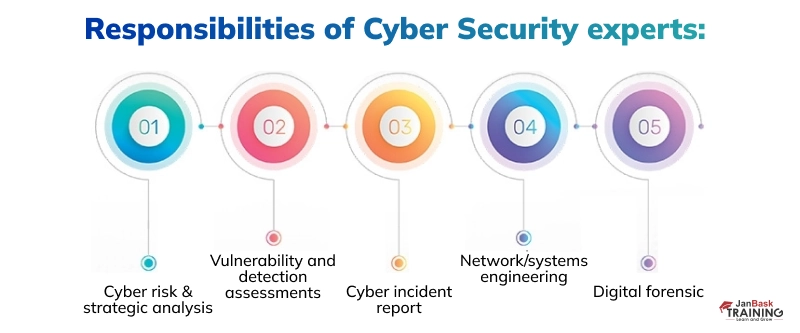
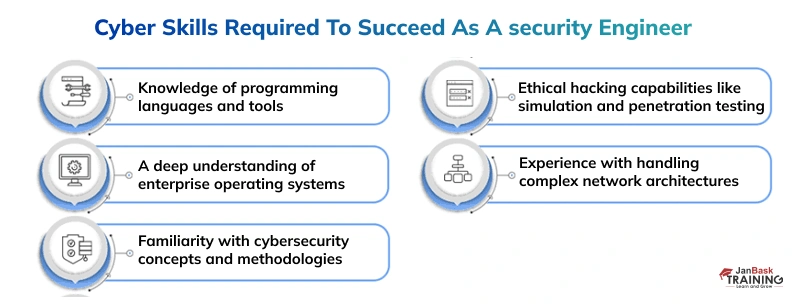
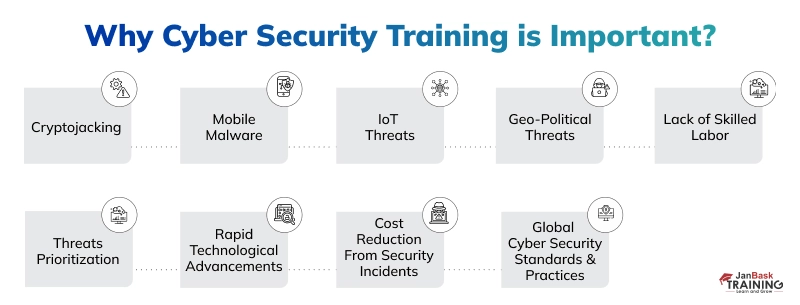

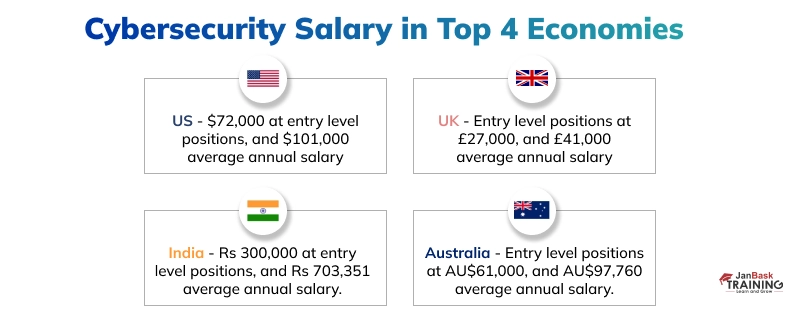
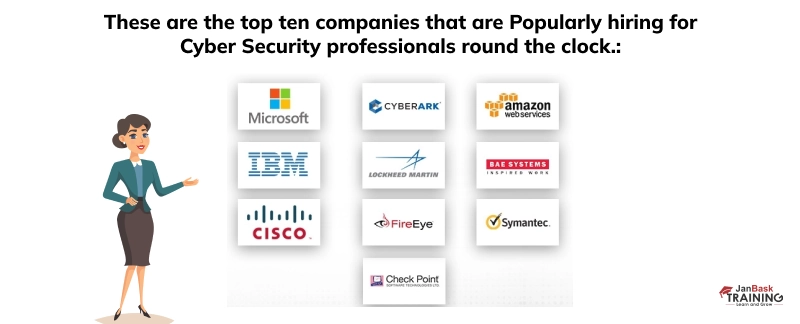






















Cash Perez
Hi! It's a very informative blog about becoming a Cybersecurity Engineer. Can we also have an insight on the various courses!
JanbaskTraining
Hey, thanks for sharing the feedback. We hope our blog has assisted you in making better decisions. For further assistance, you can connect to us at https://www.janbasktraining.com/contact-us
markyjones
I really liked the salary section. I am planning to shift to US soon, however, am confused about the scope of cyber security expert in US or Canada. This blog clarifies the doubt!
JanbaskTraining
Hey, thank you so much. We are grateful that our blog has been a help to you! For further insight do connect with us at https://www.janbasktraining.com/contact-us
Martin Roberts
Hi, it's a lovely blog about Cybersecurity Engineer. Now I am 200% times motivated to pursue this skill as career. But do you provide Cybersecurity Training?
JanbaskTraining
Hey, Thanks for sharing your feedback. We would be happy to help make a desirable decision. For further assistance, you can connect to us at https://www.janbasktraining.com/contact-us
Dallas Phillips
Excellent blog! I was confused about whether to pursue cloud certifications or cyber security. But, after reading this blog I feel that cybersecurity is the right option for me. Thank you JanBask.
JanbaskTraining
Hey, Thanks for sharing your feedback. For further insight, you can connect to us at https://www.janbasktraining.com/contact-us
pawan saxena
The tips about how to become a cyber security engineer are quite insightful for beginners like me. Please let me know a bit more about cyber security courses.
JanbaskTraining
Hey, thanks for sharing the feedback. We hope our blog has assisted you in making better decisions. For further assistance, you can connect to us at https://www.janbasktraining.com/contact-us